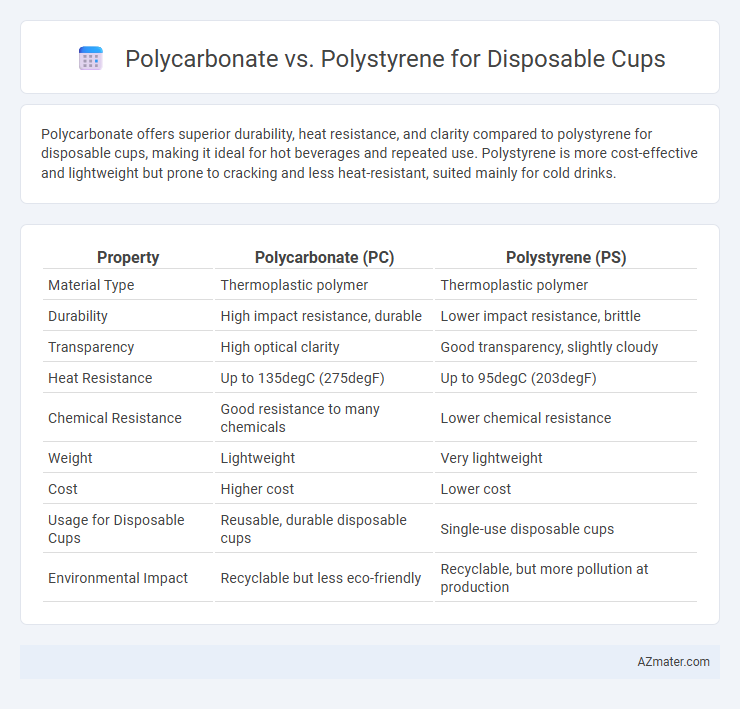Polycarbonate offers superior durability, heat resistance, and clarity compared to polystyrene for disposable cups, making it ideal for hot beverages and repeated use. Polystyrene is more cost-effective and lightweight but prone to cracking and less heat-resistant, suited mainly for cold drinks.
Table of Comparison
| Property | Polycarbonate (PC) | Polystyrene (PS) |
|---|---|---|
| Material Type | Thermoplastic polymer | Thermoplastic polymer |
| Durability | High impact resistance, durable | Lower impact resistance, brittle |
| Transparency | High optical clarity | Good transparency, slightly cloudy |
| Heat Resistance | Up to 135degC (275degF) | Up to 95degC (203degF) |
| Chemical Resistance | Good resistance to many chemicals | Lower chemical resistance |
| Weight | Lightweight | Very lightweight |
| Cost | Higher cost | Lower cost |
| Usage for Disposable Cups | Reusable, durable disposable cups | Single-use disposable cups |
| Environmental Impact | Recyclable but less eco-friendly | Recyclable, but more pollution at production |
Introduction to Disposable Cup Materials
Polycarbonate and polystyrene are common materials used for manufacturing disposable cups due to their distinct properties. Polycarbonate offers high durability, impact resistance, and clarity, making it suitable for reusable or premium disposable cups, while polystyrene is lightweight, cost-effective, and provides good insulation, ideal for single-use cold or hot beverage cups. Understanding the differences in thermal resistance, rigidity, and environmental impact is essential for selecting the appropriate material for specific disposable cup applications.
Overview of Polycarbonate and Polystyrene
Polycarbonate (PC) is a durable, impact-resistant thermoplastic widely used for disposable cups due to its clarity, heat resistance, and strength, making it ideal for both cold and hot beverages. Polystyrene (PS), in contrast, is a lightweight, inexpensive plastic commonly used for disposable cups thanks to its rigidity and insulating properties, though it is more brittle and less heat-resistant than polycarbonate. Both materials serve distinct purposes in disposable cup manufacturing, with polycarbonate offering superior durability and polystyrene favored for low-cost, short-term use.
Physical Properties Comparison
Polycarbonate offers superior impact resistance and durability compared to polystyrene, making it less prone to cracking or breaking under stress. Polystyrene has a lower melting point and is more rigid but brittle, which limits its flexibility and toughness in disposable cup applications. Polycarbonate's higher thermal stability allows it to withstand elevated temperatures, while polystyrene is more susceptible to deformation when exposed to heat.
Durability and Strength Analysis
Polycarbonate demonstrates superior durability and impact resistance compared to polystyrene, making it ideal for disposable cups that require robustness. Its higher tensile strength allows polycarbonate cups to withstand rough handling and temperature variations without cracking. Polystyrene cups are more brittle and prone to shattering under stress, limiting their durability in demanding environments.
Safety and Health Considerations
Polycarbonate cups contain bisphenol A (BPA), a chemical linked to potential endocrine disruption, raising health concerns especially with hot beverages. Polystyrene, often used in disposable cups, may release styrene, a possible carcinogen, particularly when exposed to heat or acidic drinks. Choosing cups free from BPA and styrene, such as those made from safer plastics or biodegradable materials, enhances consumer safety and health.
Environmental Impact and Sustainability
Polycarbonate disposable cups exhibit greater durability and potential for reuse, reducing overall waste compared to polystyrene cups, which are typically single-use and contribute significantly to landfill accumulation. Polystyrene's low recycling rate and slow biodegradation exacerbate environmental pollution, while polycarbonate, although less biodegradable, can be recycled more effectively under proper facilities. Sustainable alternatives are increasingly favored to minimize ecological footprints, with polycarbonate offering a more environmentally responsible choice when managed with appropriate recycling systems.
Cost Efficiency for Manufacturers
Polycarbonate disposable cups offer higher durability and heat resistance but come with a significantly higher material cost compared to polystyrene, impacting overall manufacturing expenses. Polystyrene cups are more cost-effective due to lower raw material prices and simpler processing requirements, making them favorable for large-scale, budget-sensitive production. Manufacturers must balance the trade-off between the durability of polycarbonate and the affordability of polystyrene to optimize cost efficiency in disposable cup production.
Applications and Ideal Use Cases
Polycarbonate disposable cups are ideal for hot beverages and events requiring high durability due to their heat resistance and impact strength. Polystyrene cups excel in serving cold drinks at parties and events where cost-efficiency and lightweight materials are priorities. Choosing between polycarbonate and polystyrene depends on temperature tolerance, reuse potential, and budget considerations in disposable cup applications.
Consumer Preferences and Market Trends
Consumer preferences for disposable cups increasingly favor polycarbonate due to its superior durability, heat resistance, and clarity, enhancing user experience in both hot and cold beverage applications. Market trends indicate a growing shift towards polycarbonate as businesses prioritize reusable and recyclable materials to meet sustainability goals, contrasting with polystyrene's declining use due to environmental concerns and brittleness. Demand analytics reveal that polycarbonate's ability to maintain structural integrity under varied conditions drives its adoption in premium coffee shops and event catering sectors, whereas polystyrene remains popular in low-cost, single-use scenarios.
Conclusion: Best Choice for Disposable Cups
Polycarbonate offers superior durability and heat resistance, making it ideal for disposable cups requiring sturdiness and repeated use. Polystyrene is more cost-effective and lightweight but lacks thermal resistance and environmental sustainability. For disposable cups prioritizing strength and eco-friendliness, polycarbonate is the best choice despite higher initial costs.

Infographic: Polycarbonate vs Polystyrene for Disposable cup
 azmater.com
azmater.com